By Bethana Sullivan
 Upfront let me say that Alan Turing exists in my memory bank in a minimalist way, meaning I know the broad outline of his story but not the details . I volunteered to attend the preview of the movie 'The Imitation Game' at the behest of Dan Mackay which led me to believe it must have some link or meaning or significance to the gay world , specifically to homosexual politics as lesbianism is an almost forgotten word in the story of gay politics. Much like the world at large right now, lesbian women have become more hidden and more silent: albeit to be fair, the stories of Reatheh and Jian are changing that for straight women at least. Let's hope it continues and begins to open the doors for lesbian women. I went out of interest and curiosity but also because it was free. So having declared my biases let me move on to Alan and the significance of his story for today.
Upfront let me say that Alan Turing exists in my memory bank in a minimalist way, meaning I know the broad outline of his story but not the details . I volunteered to attend the preview of the movie 'The Imitation Game' at the behest of Dan Mackay which led me to believe it must have some link or meaning or significance to the gay world , specifically to homosexual politics as lesbianism is an almost forgotten word in the story of gay politics. Much like the world at large right now, lesbian women have become more hidden and more silent: albeit to be fair, the stories of Reatheh and Jian are changing that for straight women at least. Let's hope it continues and begins to open the doors for lesbian women. I went out of interest and curiosity but also because it was free. So having declared my biases let me move on to Alan and the significance of his story for today.
 What a magnificent man; his intellect, his tenacity and his goodness stand out more than anything for me. This is a man who made difficult moral choices. As I write this I keep thinking of Any Rand's 1957 novel 'Atlas Shrugged' and its hero John Galt. Rand uses Galt to portray and illustrate her beliefs about "the power and glory of the human mind, and the right of the individual to use his/her mind solely for him/herself" (Here's the Wikipedia article on John Galt). And there are certainly overtones of this in the depiction of Turing in the film. I would have to read Andrew Hodges 1983 biography of Turing and do further research to explore this possible theme to speak more emphatically about it. Based on the film and some internet research it appears to me that the depiction of Turing serves to remind us that the philosophy of objective rationalism needs to be balanced by a caring heart.
What a magnificent man; his intellect, his tenacity and his goodness stand out more than anything for me. This is a man who made difficult moral choices. As I write this I keep thinking of Any Rand's 1957 novel 'Atlas Shrugged' and its hero John Galt. Rand uses Galt to portray and illustrate her beliefs about "the power and glory of the human mind, and the right of the individual to use his/her mind solely for him/herself" (Here's the Wikipedia article on John Galt). And there are certainly overtones of this in the depiction of Turing in the film. I would have to read Andrew Hodges 1983 biography of Turing and do further research to explore this possible theme to speak more emphatically about it. Based on the film and some internet research it appears to me that the depiction of Turing serves to remind us that the philosophy of objective rationalism needs to be balanced by a caring heart.
There are so many parallels to this today. Our own federal government uses a type of Randian philosophy to justify its decisions . Think of profit over environment, high vs. low taxation, support for global industries vs. local economies. In our social world consider the use of solitary confinement as a means of control in jails, schools and mental institutions. Look at how government spending on health, education and for veterans has been curtailed while military spending has grown. Unrestricted capitalism at its worst provides wealth for the few while simultaneously acting with an attitude of distrust, almost distain, for those who work at the everyday tasks of producing what is necessary to fulfill the needs of us all. In other words you and I. But Turing puts the good for all as his motivating raison d'etre. He isn't in it for his own glory or for profit but because it will help to overpower the efforts being made to take out the different, whether it be colour of skin, or religion or sexuality or race. Our government puts profit and power ahead of all else. Truth is shaded if not outright hidden.
 From capitalism to democracy- Turing and his team were working to support the war effort in defence of democracy. Power-with rather than power-over, working as a team. While this is one theme here there is another that is woman-focused which I will address first. Turing is played as a brilliant man who lacks emotional knowledge and the social skills to embody that knowledge. He knows how to connive and manipulate but not how to lead and be part of a group. The movement towards solution is brought to a standstill as the 'team' flounders. It is the introduction of the eternal feminine as portrayed by Keira Knightly playing the character of Joan Clarke that is pivotal to the development of Turing as the kind of person and leader needed for the team to work.. Here is a woman, a brilliant mathematician who is reduced to hiding her intellect because of the attitudes about women and their place. Instead of her intellect it is her emotional and social knowledge and skills that serve to help Turing become a more likeable person. The team begins to flourish. As well Clarke plays somewhat like the derisive moniker given to straight women who are friends with homosexuals-a fag's hag. I feel as if the portrayal of this lone female character parallels much of the claptrap being fed women these days about what it means to be a woman. It mirrors the difficulty women continue to have to be leaders and effective agents of change in our own right, not as a secretarial attachment to a male dominated team.
From capitalism to democracy- Turing and his team were working to support the war effort in defence of democracy. Power-with rather than power-over, working as a team. While this is one theme here there is another that is woman-focused which I will address first. Turing is played as a brilliant man who lacks emotional knowledge and the social skills to embody that knowledge. He knows how to connive and manipulate but not how to lead and be part of a group. The movement towards solution is brought to a standstill as the 'team' flounders. It is the introduction of the eternal feminine as portrayed by Keira Knightly playing the character of Joan Clarke that is pivotal to the development of Turing as the kind of person and leader needed for the team to work.. Here is a woman, a brilliant mathematician who is reduced to hiding her intellect because of the attitudes about women and their place. Instead of her intellect it is her emotional and social knowledge and skills that serve to help Turing become a more likeable person. The team begins to flourish. As well Clarke plays somewhat like the derisive moniker given to straight women who are friends with homosexuals-a fag's hag. I feel as if the portrayal of this lone female character parallels much of the claptrap being fed women these days about what it means to be a woman. It mirrors the difficulty women continue to have to be leaders and effective agents of change in our own right, not as a secretarial attachment to a male dominated team.
And now democracy-I was struck by how the movie mirrors a struggle for democracy that we are dealing with today. The biggest difference is that we are not fighting another country but rather the government of Canada. We are fighting for privacy rights, for freedom of speech, for freedom of information, for freedom to demonstrate in public places; for women, children, the disabled, for immigrants, for first nations, for all who are supposed to be able to stand up and be counted. We fight for truth, for justice, and for equity. We fight for fairness and mercy.
 Turing, despite being a hero, was left silent and disempowered. He died because he was who he was and there was no place for him in that time. Today we have Reatah, we have Raymond, we have Ashley we have Scott, all people who suffered and/or died because of some sort of oppressive belief system like bigotry, racism, homophobia, and misogyny.
Turing, despite being a hero, was left silent and disempowered. He died because he was who he was and there was no place for him in that time. Today we have Reatah, we have Raymond, we have Ashley we have Scott, all people who suffered and/or died because of some sort of oppressive belief system like bigotry, racism, homophobia, and misogyny.
I feel that the film (or it may just be an artistic device of the director) illustrates the Aristolean idea that logos, pathos, and good ethos are needed in order to establish credibility at all levels of understanding . And that it is rare to find all three in one person, rather it takes a team to bring them together. And today we need all three to understand and connect to and with the diversity we live with today in our society.
Several other Wayves staff went to the movie with Bethana; click here to see a compilation of their comments.

